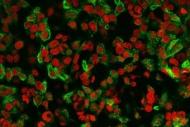MAIN INTERESTS
We are interested in elucidating the role of Glycosylation in immune response and cancer progression and in developing novel cell and antibody-based immunotherapy. Specifcally our research areas are the following:
IMMUNOLOGY
We work on the role of glycosylation – a posttranslational modification of proteins – in the modulation of immune responses to pathogens and cancer. Virtually every cell surface protein is glycosylated and a considerable number of proteins that regulate immune cell development and function bind glycans (i.e. are lectins). Our group is devoted to dendritic cells (DC), one of the most important cells of the immune system. DCs are a key link between innate and adaptive immunity. We have shown that sialic acid-containing glycans influence differentiation, maturation and the capacity of DCs to migrate, capture antigens and to prime T lymphocyte responses. One of the main goal of our research concerns the exploration of DC-based immunotherapy, and to learn how to fine tune the immune response, based on the modifications of specific glycosidic structures. This could result in the establishment of enhanced vaccines against unique signatures in tumour cells and bacteria.
It is an exciting time in Glycoimmunology – there are so many open questions and so many potential applications of new knowledge to immune host-pathogen defense and tumour immunology.

ONCOBIOLOGY
We also work on the identification of novel glycan-based biomarkers of cancer and in understanding their pathophysiological role. The strong collaboration with clinicians has allowed us to identify novel tumour-associated glycan structures in different cancers. This is achieved both through basic/fundamental as well applied/clinical research, targeted on tumour cells and tissue. We have been dedicated to bladder, lung, and breast cancer and found that some particular glycan structures are able to suppress immune functions, thus avoiding the detection and elimination of tumour cells by the immune system. We aim to understand how deranged glycosidic changes occur, how they correlate with cancer progression, metastasis and immune tolerance. We are attracted to contribute to the development of groundbreaking immunotherapeutic approaches which exploit the patient’s own immune system to control tumour progression and immune evasion.

RARE DISEASES
Congenital Disorders of Glycosylation are a group of 50 already-identified inborn errors of metabolism also known as CDG syndromes, caused by defects in glycan synthesis and on their attachment to proteins and lipids. CDG patients show multi-systemic involvement, ranging from severe developmental delay and hypotonia to hypoglycemia and protein-losing enteropathy with normal development, where immunological defects are most usually present. We are particularly interested in understanding the mechanisms behind altered immune responses frequently observed in CDG patients. We collaborate with the Portuguese Association of CDG ( APCDG) that recently formed an international platform named CDG & Allies - Professionals and Patient Associations International Network ( CDG & Allies - PPAIN - http://www.apcdg.com/research.html) directed by Pr. Dr. Paula Videira along with Dr. Vanessa Ferreira. The synergy between the Glycoimmunology Group and CDG & Allies - PPAIN aims to potentiate research projects, to create educational resources, and to raise awarness amongst society, clinicians and researchers. Um CD uma Vida (https://www.facebook.com/uncdunavida?fref=photo).
